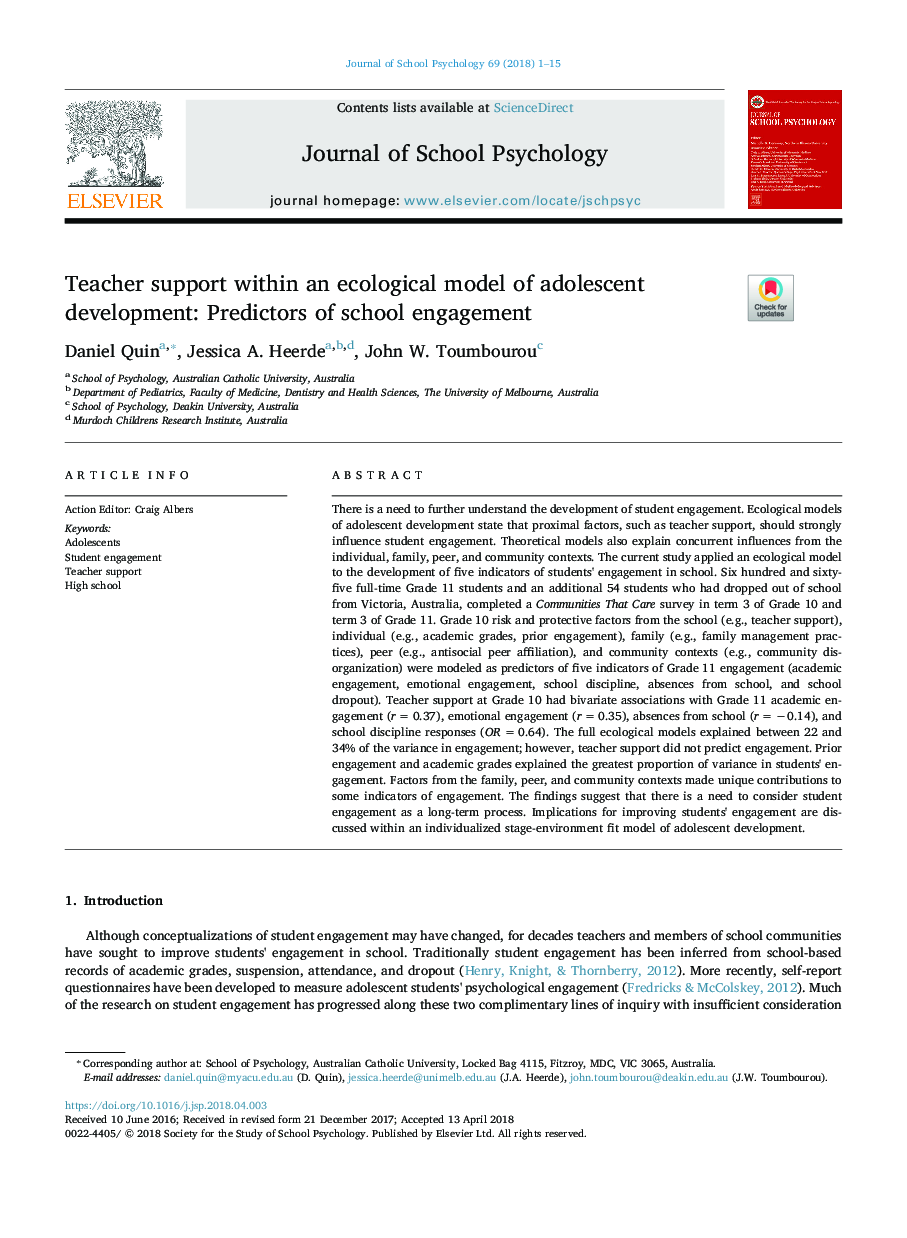| کد مقاله | کد نشریه | سال انتشار | مقاله انگلیسی | نسخه تمام متن |
|---|---|---|---|---|
| 6843701 | 1436266 | 2018 | 15 صفحه PDF | دانلود رایگان |
عنوان انگلیسی مقاله ISI
Teacher support within an ecological model of adolescent development: Predictors of school engagement
ترجمه فارسی عنوان
حمایت معلم در یک مدل اکولوژیکی توسعه نوجوانان: پیش بینی کننده مشارکت در مدرسه
دانلود مقاله + سفارش ترجمه
دانلود مقاله ISI انگلیسی
رایگان برای ایرانیان
کلمات کلیدی
نوجوانان، مشارکت دانشجویی، پشتیبانی معلم، دبیرستان،
موضوعات مرتبط
علوم انسانی و اجتماعی
روانشناسی
روان شناسی کاربردی
چکیده انگلیسی
There is a need to further understand the development of student engagement. Ecological models of adolescent development state that proximal factors, such as teacher support, should strongly influence student engagement. Theoretical models also explain concurrent influences from the individual, family, peer, and community contexts. The current study applied an ecological model to the development of five indicators of students' engagement in school. Six hundred and sixty-five full-time Grade 11 students and an additional 54 students who had dropped out of school from Victoria, Australia, completed a Communities That Care survey in term 3 of Grade 10 and term 3 of Grade 11. Grade 10 risk and protective factors from the school (e.g., teacher support), individual (e.g., academic grades, prior engagement), family (e.g., family management practices), peer (e.g., antisocial peer affiliation), and community contexts (e.g., community disorganization) were modeled as predictors of five indicators of Grade 11 engagement (academic engagement, emotional engagement, school discipline, absences from school, and school dropout). Teacher support at Grade 10 had bivariate associations with Grade 11 academic engagement (râ¯=â¯0.37), emotional engagement (râ¯=â¯0.35), absences from school (râ¯=â¯â0.14), and school discipline responses (ORâ¯=â¯0.64). The full ecological models explained between 22 and 34% of the variance in engagement; however, teacher support did not predict engagement. Prior engagement and academic grades explained the greatest proportion of variance in students' engagement. Factors from the family, peer, and community contexts made unique contributions to some indicators of engagement. The findings suggest that there is a need to consider student engagement as a long-term process. Implications for improving students' engagement are discussed within an individualized stage-environment fit model of adolescent development.
ناشر
Database: Elsevier - ScienceDirect (ساینس دایرکت)
Journal: Journal of School Psychology - Volume 69, August 2018, Pages 1-15
Journal: Journal of School Psychology - Volume 69, August 2018, Pages 1-15
نویسندگان
Daniel Quin, Jessica A. Heerde, John W. Toumbourou,
